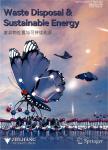Techno-economic assessment of energy generation through municipal solid waste:a case study for small/medium size districts in Pakistan
作者机构:Sustainable Development Policy InstituteIslamabadPakistan Mechanical Engineering DepartmentUniversity of Engineering and TechnologyTaxilaPakistan
出 版 物:《Waste Disposal and Sustainable Energy》 (废弃物处置与可持续能源(英文))
年 卷 期:2020年第2卷第4期
页 面:337-350页
核心收录:
学科分类:083002[工学-环境工程] 0830[工学-环境科学与工程(可授工学、理学、农学学位)] 1202[管理学-工商管理] 1201[管理学-管理科学与工程(可授管理学、工学学位)] 08[工学]
主 题:Municipal solid waste Waste to energy Levelized cost of energy Technological assessment Economic assessment
摘 要:There is an increase in annual waste generation due to urbanization,industrialization,and population growth.The waste management crisis in developing countries and its complexity from region to region has inspired extensive research work in this area.Poor management not only results in environmental hazards,but it also causes significant socio-economic losses.Due to the absence of comprehensive studies on waste to energy(WTE)assessment,this study assesses and reports the merits of alternative technologies for converting WTE in small and medium-size districts.Quantitative analysis for waste collection data in this study uses a pilot study approach to provide useful insights and waste classification.A cantonment district of Pakistan(Wah Cantt)has been used as a case study for performing a technological and economic assessment of energy generation through the use of thermal and biological treatment processes.A mathematical modeling approach has been adopted for generating an economic value of each technology through which this waste can be processed.Further,the levelized cost of energy(LCOE)based assessment has been performed to provide a methodological framework for selecting the most feasible WTE technology in a small or medium-size district.Based on the model results,anaerobic digestion appears to be the most sustainable technology due to the organic nature of waste in Wah Cantt,land legislation,and availability of area to install a waste plant.Considering all the waste collected,the district can generate approximately 14.4 MW of energy through thermal treatment,19,110 m^(3) of daily biogas through anaerobic digestion,and 5 million tons of fertilizer through composting.Hence,if a proper supply chain is established for converting a portion of Pakistan’s annual waste generation,a significant amount of waste energy potential can be restored.



